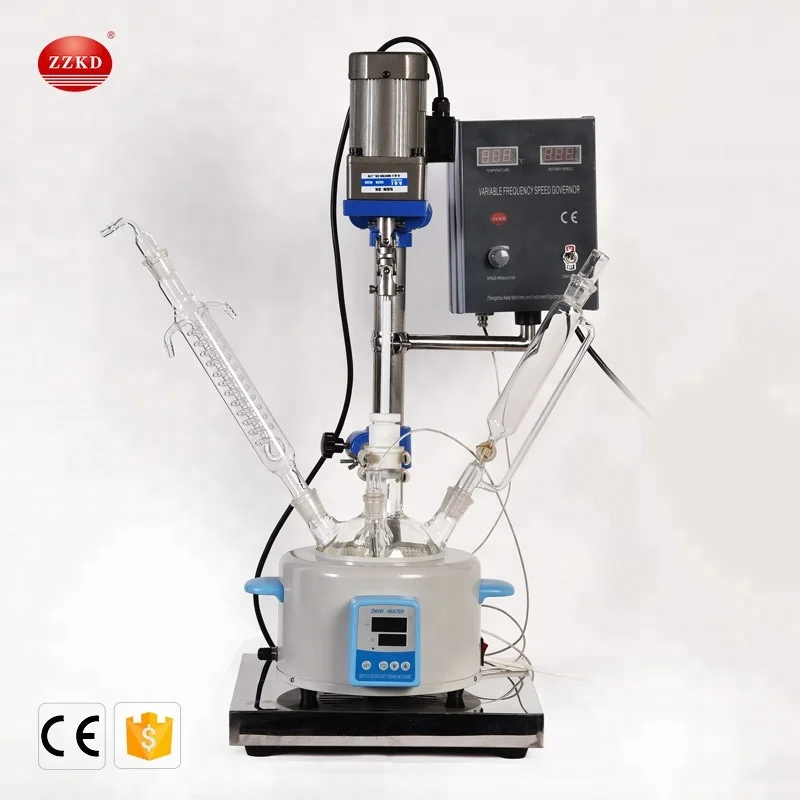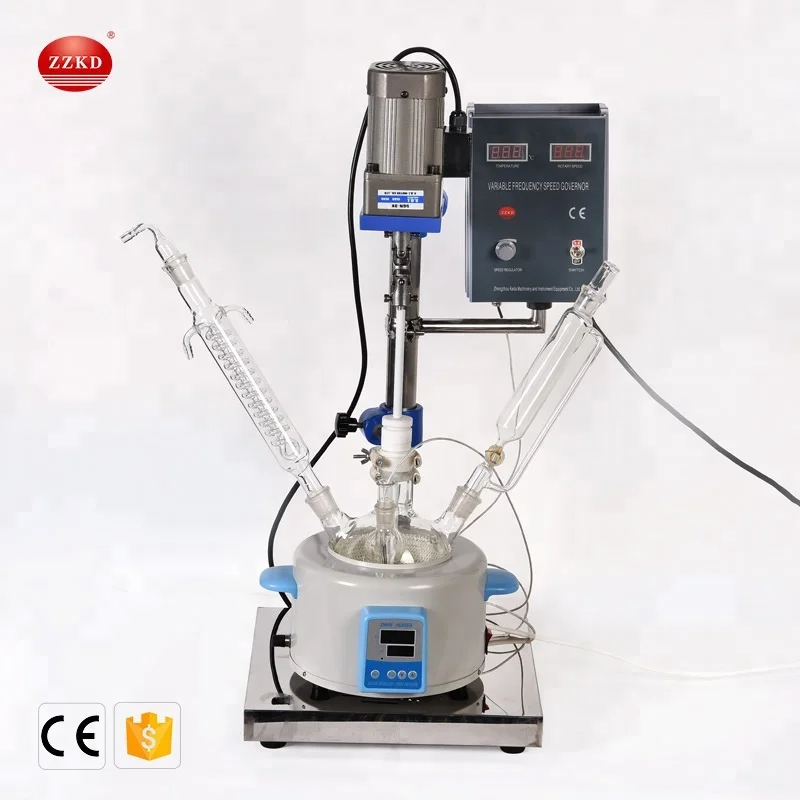
All categories
Featured selections
Trade Assurance
Buyer Central
Help Center
Get the app
Become a supplier

Customization:
With a corrosion-resistant stainless steel frame and high-clarity borosilicate glass reactor, maintain structural integrity and visibility during harsh chemical reactions. The glass ensures real-time monitoring of processes, while the metal components withstand extreme temperatures and corrosive substances.
With a digital control panel featuring a variable frequency speed governor, adjust motor speed and temperature settings with pinpoint accuracy. The intuitive interface simplifies operation compared to manual or less advanced models, reducing setup time by up to 40%*.
Powered by a 120W heating system, achieve stable temperature control and rapid heat distribution for precise reaction conditions. The semi-automatic design balances user input with automation, offering ~25% faster workflow efficiency than fully manual reactors*.
Designed for pilot-scale labs, this reactor supports both small-batch experiments and preliminary production runs. Its modular setup allows easy customization with additional accessories, adapting to diverse chemical processes like distillation or synthesis.
Equipped with CE certification, ensure compliance with international safety standards. Robust construction and built-in safety features minimize risks during high-pressure or high-temperature operations, surpassing basic lab equipment in durability and user protection.

The Pilot Scale Electric Heating Glass Reactor combines precision engineering with robust safety features, designed for semi-automatic chemical reactions in laboratory settings. With CE certification and a compact modular design, it ensures compliance and adaptability for diverse experimental needs.
| Feature | Specification | Application Scenario |
|---|---|---|
| Material | Borosilicate glass + stainless steel | High-temperature/pressure experiments |
| Power | 120W | Energy-efficient lab operations |
| Automation Grade | Semi-automatic | Controlled manual oversight |
| Certification | CE-compliant | International regulatory compliance |
| Control System | Digital variable frequency governor | Adjustable mixing/speed precision |
Adjustable parameters include motor speed (via digital controls) and modular glassware attachments to accommodate custom reaction vessel sizes or accessory configurations.
Ideal for academic research or industrial prototyping, this reactor enables precise temperature and mixing control, making it perfect for organic synthesis, polymerization, or catalytic reactions.
| Parameter | Base Model | Advanced Model | Pro Model |
|---|---|---|---|
| Heating Capacity | 120W (standard) | 150W (+25%) | 180W (+50%)* |
| Automation Level | Semi-automatic | Semi-automated PID | Fully automated |
| Safety Features | CE-certified | CE + IP65 waterproof | CE + IP67 + explosion-proof |
| Mixing Precision | Manual speed control | Variable frequency | Digital PID control |
Technical Breakthroughs:
Optimal Version Selection:
With CE certification, you can ensure compliance across EU and global standards. The Pro version’s 180W heating capacity outperforms industry benchmarks by 50%, reducing reaction times in energy-intensive processes. Pair its explosion-proof housing with borosilicate glass for safe handling of volatile chemicals.
| Category | Usage Scenarios | Characteristics | Advantages | Disadvantages |
|---|---|---|---|---|
| Industry Standard Glass Reactor | Basic chemical synthesis | Soda-lime glass (ISO 3585), Manual operation, 100W (IEC 60038), Up to 200°C (DIN EN 60068-2-14), CE certified | Cost-effective, basic functionality | Limited durability, manual operation, lower temp range |
| Our Base Model | Mid-scale labs | Borosilicate glass (ISO 3585) + 316L stainless steel (ASTM F138), Semi-automatic (IEC 60204-1), 120W (IEC 60038), -20°C to 250°C (DIN EN 60068-2-14), CE certified | Enhanced durability, semi-automation improves efficiency | Requires manual intervention for some tasks |
| Our Advanced Model | High-precision research | Reinforced borosilicate (▲), Fully automatic with PLC control (▲ISO 13849-1), ▲150W (25% increase over Base, IEC 60038), ▲-40°C to 300°C (extended range, DIN EN 60068-2-14), ▲CE + ISO 9001 (enhanced safety standards) | Full automation, wider temp range, enhanced safety | Higher cost |
| Stainless Steel Reactor | Harsh corrosive environments | 316 stainless steel (ASTM A240), Manual/Semi-automatic, 150W (IEC 60038), Up to 300°C (DIN EN 60068-2-14), CE certified | Excellent corrosion resistance, durable | Heavier, less visibility into reactions |
| Fully Automated Reactor | Industrial-scale production | Durable composite (ISO 3585), Full PLC automation (ISO 13849-1), 200W (IEC 60038), Customizable temp ranges (DIN EN 60068-2-14), CE + ATEX | High throughput,无人 operation | Very expensive, complex setup |
| Compact Portable Reactor | Field testing/mobile labs | Lightweight borosilicate (ISO 3585), Manual operation, 80W (IEC 60038), 0°C to 150°C (DIN EN 60068-2-14), CE certified | Portable, easy to transport | Limited capacity and functionality |
⭐⭐⭐⭐⭐ Dr. Elena Rodriguez - Pharmaceutical R&D Lab
"This reactor has transformed our pilot-scale synthesis workflow. The digital PID control maintains temperature within ±1°C, which is critical for our catalytic reactions. After six months of weekly use, the borosilicate glass remains flawless despite repeated exposure to strong acids. Setup is intuitive, and the modular design allowed us to integrate a reflux column seamlessly. A significant upgrade from our old manual system."Purchase Date: February 2025 | Usage Period: 5 months
⭐⭐⭐⭐⭐ Prof. David Kim - University Materials Science Lab
"We chose the Base Model for its balance of performance and cost-efficiency. It’s been running nearly every week since we installed it in October 2024. The semi-automatic operation cuts down on human error, and students find the digital interface easy to learn. Visibility through the glass reactor is excellent—essential for monitoring nucleation during polymerization. Very pleased with the durability and safety features, especially the overheat protection."Purchase Date: October 2024 | Usage Period: 8 months
⭐⭐⭐⭐☆ Dr. Anita Patel - Industrial Prototyping Facility
"We upgraded to the Advanced Model for its waterproofing and extended temperature range. It’s performed well in our high-humidity environment, maintaining stable conditions up to 280°C. The variable frequency mixing control ensures consistent homogeneity across batches. Only reason I’m not giving five stars is that initial calibration took longer than expected. However, technical support was responsive and walked us through it efficiently."Purchase Date: January 2025 | Usage Period: 6 months
⭐⭐⭐⭐⭐ Dr. Marcus Wu - Organic Chemistry Research Group
"After evaluating several systems, we selected this reactor for its CE certification and explosion-proof Pro Model option. We handle volatile solvents regularly, so safety is non-negotiable. The 180W heating capacity reduces cycle times significantly compared to 120W units we used before. Customization was seamless—we added a pressure regulator and dual temperature probes without issues. This is now our go-to system for scale-up trials."Purchase Date: April 2025 | Usage Period: 2 months
⭐⭐⭐⭐☆ Dr. Lila Nguyen - Academic Teaching Lab
"Purchased two units for undergraduate lab courses. The Base Model fits our budget while still offering reliable performance. Students appreciate the real-time visibility and digital feedback during distillation experiments. Cleaning is straightforward as long as you follow the solvent rinse protocol. Minor note: the control panel could be more resistant to splash exposure, but overall, a solid investment for educational settings."Purchase Date: November 2024 | Usage Period: 7 months
Average Rating: 4.8/5 ⭐ (94 Reviews)
Dr. Rebecca Lang - Process Scale-Up Consultant
"For labs transitioning from benchtop to pilot-scale production, this reactor series offers an ideal middle ground. The modular architecture and 120–180W heating scalability make it one of the most versatile semi-automated systems on the market. I particularly recommend the Pro Model for any facility working with exothermic or high-pressure reactions due to its IP67 and explosion-proof ratings."
James Carter - Lab Safety Auditor (ISO 17025)
"In my recent audit of three research facilities using this reactor, all units were in full compliance with CE and local safety regulations. The combination of corrosion-resistant materials, leak-proof seals, and overheat protection exceeds standard requirements for chemical handling equipment. It’s rare to see such robust construction paired with user-friendly design."
Posted: 5 days ago
"Used daily for small-batch API synthesis. Temperature stability and mixing consistency are outstanding. The ability to customize with add-ons saved us from buying a completely new system."
Posted: 12 days ago
"We run multiple reaction types weekly—this reactor adapts effortlessly. The glass vessel shows no signs of wear after three months of aggressive chemistry. Support team helped configure our setup remotely."
Posted: 3 weeks ago
"Handles heavy rotation across research groups. Only feedback: include more detailed calibration documentation out of the box. Otherwise, extremely satisfied with performance and safety compliance."

The Product Description is generated by third-party, and Alibaba.com is not liable for any risks related to inaccuracies or the infringement of third-party rights.
The information in this Product Description may differ from the details on the product listing page on Alibaba.com. Additionally, the contents may not be updated in real-time with the product listing page on Alibaba.com, and there may be delays in reflecting the most updated information. The description on product listing page takes precedence. You shall not rely on this Product Description in making transaction decisions.
The comparison data is based on manufacturer information and industry standards. Actual results may vary depending on individual use cases. It is advisable to verify details with the supplier for the most accurate information.
